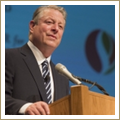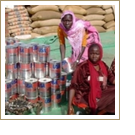 |
View this newsletter in your browser. |
 |
| Research Highlights | |
| People Spotlights | |
| Program Updates | |
| In the News |
| Calendar of Upcoming Events | |
| May 20 |
Lecture co-sponsored by ReNUWIt and Water in the West |
| "Blueprint for Integrating Technology Innovation Into the National Water Program" Nancy Stoner, Acting Assistant Administrator for Water at the U.S. Environmental Protection Agency, will discuss the agency's commitment to innovation in the urban water sector, with a particular focus on the West » Read more ... |
|
| May 20 |
Energy Seminar |
| "China Miniseries (5 of 5): Beijing's Bets - Planning China's Energy Future" Zhongying Wang, Deputy Director General, Energy Research Institute, China National Development and Reform Commission » Read more ... |
|
| May 22 |
Environmental Forum |
| Environmental Forum "Ecology of Defaunation, Biodiversity Change and Risks of Human Disease" Stanford Woods Institute Senior Fellow Rodolfo Dirzo (Biology) » Read more ... |
|
| May 23 |
FSE Global Food Policy and Food Security Symposium |
| "Water and Agriculture in a Changing Africa: What Might Be Done?" John Briscoe, Gordon McKay Professor of the Practice of Environmental Engineering, Harvard University; and Jennifer Burney (commentator), Assistant Professor of Science, Technology, Engineering and Policy in the School of International Relations and Pacific Studies, University of California, San Diego » Read more ... |
|
| May 31 |
Young Environmental Scholars Seminar Series |
| "Roundtable on Water: 'Divining Water': Locating the Socio-Political Contexts of Water" The YES Seminar Series organized by and for Stanford postdoctoral scholars and graduate students brings together environmental researchers from all seven schools at Stanford for innovative dialogue and productive collaboration regarding environmental issues » Read more ... |
|
| June 3 |
Energy Seminar |
| "Stanford Solar Decathlon: Start.Home" Members of the team working on Stanford's first entry in the U.S. Department of Energy Solar Decathlon competition discuss the project » Read more ... |
|
Remembering a 'Force of Nature'Former Vice President Al Gore was at Stanford recently to remember a friend. Gore spoke at a private ceremony dedicating a stone bench in honor of Stephen Schneider, a Stanford Woods Institute senior fellow who died in 2010. Gore also spoke later that day, giving the first annual Stephen H. Schneider Memorial Lecture. "He was a force of nature," Gore said of Schneider. "He was sui generis." Schneider inspired others, Gore noted, with "his passion, his commitment, his stamina, his relentless desire to keep working for the truth and to get the message out." Schneider's work to raise awareness of climate change was "awe inspiring," Gore said. "There are very few people in history as successful as Steve was in helping to protect that only home we have ever known." Schneider's legacy continues to inspire Woods researchers seeking solutions to global environmental challenges. Read on to learn more about their recent work. Sincerely, |
||
Debbie Drake Dunne |
Jeffrey R. Koseff |
Barton H. Thompson, Jr. |

How to Feed the World Without Deforesting the PlanetGlobalization is driving widespread land conversion for agriculture, but it can also be a force for responsible land use, according to Stanford Woods Institute Senior Fellow and land use expert Eric Lambin. During a Stanford Department of Environmental Earth System Science seminar, Lambin presented research with far-reaching implications for policymakers, businesses and consumers. Among the findings: There is much less potentially available cropland globally than previous estimates have suggested. Perhaps surprisingly, however, we don't need to clear more land, including forests, to plant hunger-alleviating crops, Lambin said. |

Climate Change-Related Risks and Options for California's CoastIt's up to California's coastal managers to figure out how to respond to climate change-related impacts that could affect thousands of residents, billions of dollars of resources and invaluable marine ecosystems. An assessment co-authored by Senior Lecturer and Center for Ocean Solutions Executive Director Meg Caldwell (Law) and postdoctoral scholar Ryan Kelly (Center for Ocean Solutions) examines climate change-related coastal risks and suggests solutions. Among the assessment's recommendations: reform of programs such as federal flood insurance that subsidize high-risk coastal development. |

Toward a Healthier DeltaCalifornia's story is, in great part, a story of water. Future chapters of that story depend on wise management of the Sacramento-San Joaquin Delta, one of the state's most important sources of drinking water and agricultural irrigation. As the state considers plans for the Delta, including a multi-billion-dollar tunnel project to divert water into canals, a new report co-authored by Stanford Woods Institute Co-Director Buzz Thompson offers a blueprint to improve the health of the ecosystem. Among the report's recommendations: Restore natural processes wherever possible and create a new state office to coordinate and expedite regulatory actions that affect the Delta. (Watch a video of Thompson moderating a related panel discussion with state and municipal regulatory officials.) |
| For more research, see the Stanford Woods Institute quarterly Research Digest. |

Jasper Ridge at 40The Stanford campus is peppered with laboratories conducting bleeding-edge research. But perhaps the closest thing the university has to a time machine is a patch of wild grass found alongside a dirt path that turns off Sand Hill Road a few miles west of Interstate 280. For 40 years, Jasper Ridge Biological Preserve has been the site of transformative ecological research by scientists, including Stanford Woods Institute Senior Fellows Paul Ehrlich, Chris Field and Hal Mooney, and Woods-affiliated biology Professor Deborah Gordon. |

Al Gore Connects Climate Change Inaction to Political Dysfunction"Our democracy has been hacked. The operating system has been taken over." That was the message former Vice President Al Gore brought to Stanford recently as part of the first annual Stephen H. Schneider Memorial Lecture in honor of the Stanford Woods Institute senior fellow and world-renowned climate scientist who died in 2010. In an impassioned call to civic and environmental action, Gore railed against a political system that fails to serve the majority's interests when it comes to climate change and other pressing issues. |

Hydroelectricity's PromiseOn the one hand, dams hold the promise of green energy that forgoes fossil fuels. On the other hand, dams can displace communities, flood valuable ecosystems and contribute to greenhouse gas emissions through decomposition of organic matter in water reservoirs. The Stanford Woods Institute and the Osa and Golfito Initiative recently hosted an Uncommon Dialogue workshop to explore the potential for ecological design and operation of dams, specifically Costa Rica's planned Diquis and Savegre hydroelectric projects. Dam design and operation experts met with representatives from the Costa Rican Electricity Institute, the country's government-run electricity and telecommunications services provider, to discuss potential challenges and opportunities. |

A Good Idea With Little Chance: Food Aid ReformPresident Barack Obama's 2014 budget proposal promises significant food aid reform that will enable the United States to feed about 4 million more people without a significant increase of the current $1.8 billion budget for this aid. The intention of the reform is to make food aid more efficient, cost effective and flexible. In a recent interview, Barry Riley, a food aid expert and visiting fellow at the Center on Food Security and the Environment, discussed the importance of these reforms, their chances of passage and the country's current role in international food aid. |

Showcasing Environmental BreakthroughsAt Stanford's Celebrating Sustainability Festival on April 22 - Earth Day - Stanford Woods Institute researchers demonstrated a range of breakthrough environmental solutions. At the Woods booth, festival-goers could do a virtual reality simulation in which they sawed down a tree and heard about how the experience affects people's environmental behavior. They also learned how rocket science can create clean energy from wastewater. Dozens of people examined biodegradable plastic made from waste gas, a low-cost mobile toilet that promises hygienic sanitation for urban slum residents, a coral sample bleached by a warming ocean and an elegantly simple water disinfection device that doesn't rely on electricity or moving parts. |
| Selected media coverage of the Stanford Woods Institute and its fellows, affiliated scholars and supported research |
Greenhouse Gas Sets Atmospheric RecordSan Francisco Chronicle, May 7 |
How Americans See Global Warming - in 8 ChartsThe Washington Post, April 22 |
When the Earth Moved: What Happened to the Environmental Movement?The New Yorker, April 15 |
Purple Sea Urchins Evolve in a Flash to Survive Growing AcidityNBC News, April 9 |
Scientists Question Impact as Vineyards Turn Up in New PlacesThe New York Times, April 8 |
New Research Suggests PV Industry Is a Net Electricity ProducerPV Magazine, April 4 |
Major Media Coverage of Stanford Poll on Climate Adaptation |
| Find Us on the Web |
Read more News and Media Coverage from the Stanford Woods Institute's fellows and affiliated faculty, including fellows with our Leopold Leadership Program. Submissions Past issues can be found online. For more information about the Stanford Woods Institute, visit our website, or email us at environment@stanford.edu. |